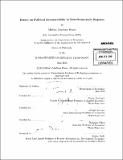| dc.contributor.advisor | Daron Acemoglu, Abhijit Banerjee and Benjamin Olken. | en_US |
| dc.contributor.author | Martínez Bravo, Mónica | en_US |
| dc.contributor.other | Massachusetts Institute of Technology. Dept. of Economics. | en_US |
| dc.date.accessioned | 2010-08-30T14:46:35Z | |
| dc.date.available | 2010-08-30T14:46:35Z | |
| dc.date.copyright | 2010 | en_US |
| dc.date.issued | 2010 | en_US |
| dc.identifier.uri | http://hdl.handle.net/1721.1/57704 | |
| dc.description | Thesis (Ph. D.)--Massachusetts Institute of Technology, Dept. of Economics, 2010. | en_US |
| dc.description | Page 173 blank. Cataloged from PDF version of thesis. | en_US |
| dc.description | Includes bibliographical references. | en_US |
| dc.description.abstract | This thesis is a collection of three independent essays on the causes and consequences of local elections in non-democratic regimes. The first essay examines the political consequences of local elections on the first democratic election after the fall of an autocratic regime. My theoretical analysis highlights that officials that were appointed by upper levels of government have a stronger incentive to continue to use local patronage networks to signal their alignment to upper levels of government, in order to protect their jobs. Therefore, if the previous dictator's party has a substantial probability of winning the election, appointed leaders will promote their electoral chances, which could become an impediment for the process of democratic consolidation. In contrast, elected local officials have a weaker incentive to signal their political leanings since their continuity in their positions does not depend on changes in upper levels of government. I provide evidence from the first democratic election in Indonesia after the fall of Suharto that corroborates the implications of the model. The second essay evaluates the economic and social impact of the introduction of local elections rural China during the last three decades. Our empirical findings highlight that elections led to a substantial reduction in income and income growth, decreased within village inequality and relaxed the enforcement of unpopular policies. These effects seem to be driven by a redistribution of assets from firms to households. We provide a simple model to illustrate how these findings can theoretically be a consequence of the shift in the accountability of local leaders, from the central government towards villagers. The third essay investigates the determinants of the existence of local elections in nondemocratic regimes. I develop a theoretical framework to explore the trade-offs for a dictator in the decision to allow local elections. The model highlights that, if the dictator values the competence of local politicians and voters have intermediate costs of military intervention, the dictator prefers local elections over an appointment system. In this scenario, elections aggregate voters' private information on competence efficiently and the ex-post alignment of voters' and dictator's preferences is maximized. | en_US |
| dc.description.statementofresponsibility | by Mónica Martínez Bravo. | en_US |
| dc.format.extent | 173 p. | en_US |
| dc.language.iso | eng | en_US |
| dc.publisher | Massachusetts Institute of Technology | en_US |
| dc.rights | M.I.T. theses are protected by
copyright. They may be viewed from this source for any purpose, but
reproduction or distribution in any format is prohibited without written
permission. See provided URL for inquiries about permission. | en_US |
| dc.rights.uri | http://dspace.mit.edu/handle/1721.1/7582 | en_US |
| dc.subject | Economics. | en_US |
| dc.title | Essays on political accountability in non-democratic regimes | en_US |
| dc.type | Thesis | en_US |
| dc.description.degree | Ph.D. | en_US |
| dc.contributor.department | Massachusetts Institute of Technology. Department of Economics | |
| dc.identifier.oclc | 655889389 | en_US |
